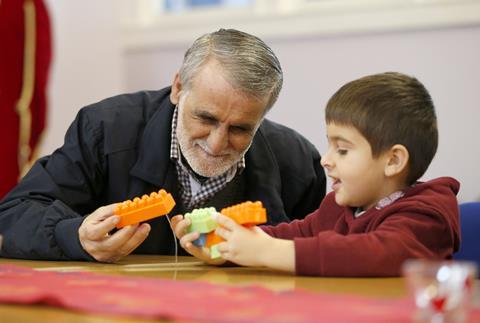The numbers of asylum seekers turning to churches for help is rising fast, says Rev Dr Malcolm Patten. Here’s how church leaders can wisely help them find or continue in their Christian faith

Nobody could fail to be horrified at the chemical attack on a mother and her two children on 31 January in London. The accused, Abdul Shokoor Ezedi, who was granted asylum in 2020 on the basis of his conversion to Christianity, is still being sought by police. Meanwhile, former Home Secretary, Suella Braverman has pointed to church leaders, accusing them of aiding bogus asylum claims on an “industrial scale”.
Former Archbishop of Canterbury, Dr Rowan Williams, has quite rightly challenged politicians to provide evidence for such accusations, but those of us who work with asylum seekers know all too well the concerns that such people may attempt to game the system.
Yet there is another side to the story.
Asylum seekers from countries such as Afghanistan and Iran are fleeing regimes in which they have faced oppression and, though people of faith, are rejecting the extreme form of Islam which they have suffered under.
Essentially, it is for the Home Office or a tribunal judge to decide if asylum should be granted, not church leaders
They have faced arrest, physical and mental abuse, flogging, threats of death and persecution from their own communities. During their journey to the UK, many have slept rough, experienced abuse and exploitation, and faced death crossing open water in flimsy boats. Yet returning to their home country is not a viable option.
A welcome refuge
Churches are one of the few, and often the first place where asylum seekers experience welcome, friendship, support and compassion. Yes, it can help with their asylum claim, but they discover much more than that. For the first time in a long time, they are given hope.
It is only natural that helping with asylum claims is something Christians are willing to do. So how can we do it well? How can we ensure people are well grounded in their new faith in Christ and become faithful and fruitful members of the Christian community?
Here are a few things I have learnt along the way:
1. Take your time
There is no virtue in rushing through a course or a baptism to hit an interview or appeal deadline. Home Office officials and appeal judges sensibly frown upon baptisms that happen too soon. Taking the time to work through Alpha or Christianity Explored, as well as helping people find their way around scripture enables them to understand the Christian faith well. This will bear fruit for years. Organisations such as Elam Ministries produce great resources for church leaders working with Iranian refugees for example.
2. Offer support with asylum claims
Share your observations and, if you feel they are genuine believers, explain why you think that is the case. A baptism certificate is no magic wand as asylum seekers will be asked various questions, such as what parts of the Bible are their favourite and why, or how Christianity has impacted their life. Essentially, it is for the Home Office or a tribunal judge to decide if asylum should be granted, not church leaders.
3. Help asylum seekers ‘own’ their faith
Writing their own journey towards Jesus, and reflecting on the differences between their faith of birth and their new life with Christ can help to make sense of it and help them feel confident in expressing it to others. Praying aloud in a small group, living out their faith through serving and becoming part of a Christian community all help people to become rooted and established in their faith.
4. Share good resources
Create a WhatsApp group where scriptures and short videos in their own language can be shared regularly and mutual support between asylum seekers can be encouraged. Asylum seekers are often relocated at short notice, so this also helps people to keep in touch and offer support until they find a new Christian community.
5. Support refugees for the long-term
If an asylum seeker is granted leave to remain, they will face new challenges. They will have the opportunity to work, but will need to find new accommodation quickly. They will have to navigate the welfare system for support until they become self-sustaining. Their first jobs will often be in low paid service sector jobs, which often conflict with the usual times of church activities. Finding ways to help them stay connected becomes even more important.
6. Offer pastoral care
Even as life moves on after gaining asylum, many people are still dealing with the trauma of their journey so far. It is not uncommon to discover mental health issues including anger surfacing, often under the day-to-day stress of life. They will want to support family members who remain in their home country and continue to live under difficult or extreme conditions. They will feel the pain of being far from home when an elderly family member dies and they are unable to return. Continuing to offer a supportive space to chat and socialise is crucial for discovering the peace and joy of following Christ in all its fullness.
Churches are often the first place where asylum seekers experience welcome, friendship, support and compassion
The surge of asylum seekers coming to our churches for help over the last decade is unprecedented, and there have been no blueprints to help us respond well. It is hard work and time-consuming. However, experience is growing; we are getting better at it and the sense of participating in the new life God is stirring in migrating people across our world gives us a fresh vision of God’s glory.
Despite the background noise in the political sphere, and increasing conflict around the world, God is doing a new thing, building his kingdom and bringing together people of every nation, tribe and tongue to worship the lamb upon the throne.




































1 Reader's comment